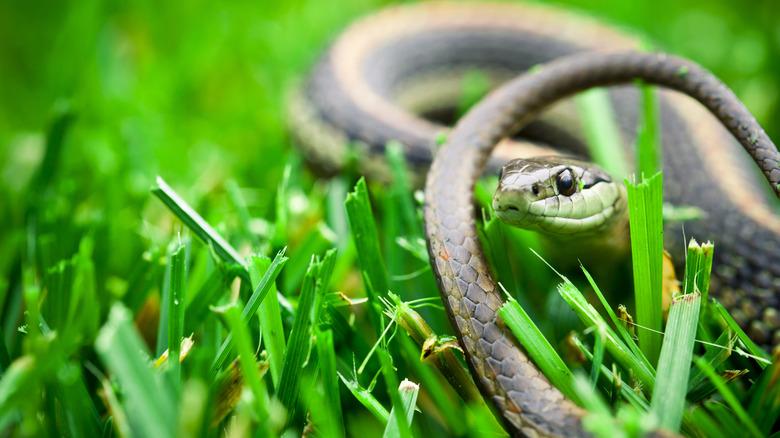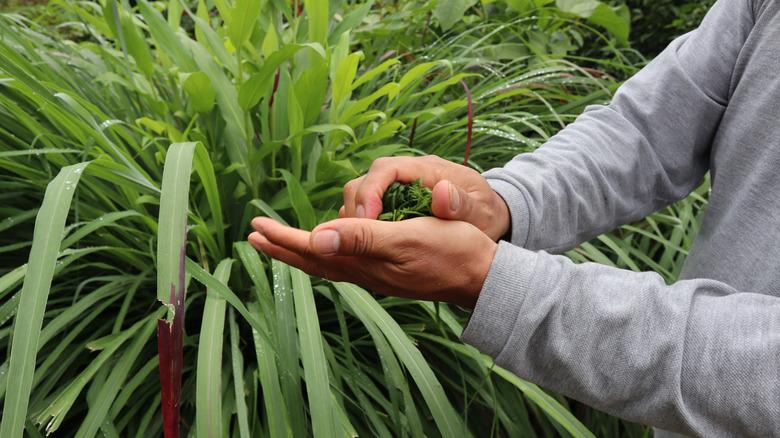The Plant You'll Want To Grow To Keep Snakes And Other Pests Out Of Your Yard
The beauty of home gardens is that they attract all sort of wildlife to the yard that we love to see. Whether it be flowers that attract hummingbirds or blossoms that invite bees (we don't even mind the occasional rabbit munching on our veggies), there's something simply fairy tale-like when it comes to critters in the garden. However, there is one visitor that can be a cause for concern, particularly if they're dangerous to humans or pets: Snakes. While most garden variety snakes are non-venomous and largely harmless, like the garter snake, these critters tend to be persistent in their habitation and difficult to banish. At times, when agitated, even the smallest snake will bite, so it behooves the homeowner to learn safe methods for how to get rid of snakes in their yard. However, that is sometimes easier said than done, and sometimes the best method of snake banishment is actually prevention.
Enter lemongrass (Cymbopogon citratus), a warm-weather perennial native to Southeast Asia that's commonly utilized in cuisines of the region. While it is a tasty, fragrant plant to be sure, its true power lies in its repellent properties. Lemongrass contains citronella oil, an aromatic ingredient that can be extracted for a number of uses in and outside of the garden. Utilized for centuries in holistic, herbal remedies, citronella oil is today best known as a natural insect repellent, particularly against pests like mosquitoes and other biting bugs. But lemongrass and its citronella component can repel fleas, ticks, and ward off much bigger, unwanted visitors, like snakes.
What's the science behind lemongrass and snakes?
The strong aroma of citronella oil is the primary fighting agent against snakes. In a study published in Toxicon, a journal co-produced by the North American Society of Toxinology, researchers found that lemongrass' scent is a primary contributor to the effectiveness of natural snake repellents. This assertion is supported by the Research Journal of Pharmacognosy, which elaborates that the volatile oils found within lemongrass blades are noxious enough to snakes to keep them at bay. The smell isn't just offensive to them, it actually disorients them. In an interview with Home & Garden, pest control expert Nicole Carpenter explains that the strong scent of lemongrass "makes it difficult for them (snakes) to hunt." Since it's likely that snakes are drawn to gardens to hunt small prey like rodents, lemongrass effectively discombobulates the serpents, making your yard a less attractive hunting ground. Increasingly, researchers are studying natural alternatives to chemicals for pest-fighting strategies, and lemongrass is among the plants found to be effective.
Secondly, snakes are also dissuaded from visiting gardens with lemongrass in them because of the plant's extremely sharp blades. They don't like slithering around areas that prove harmful to their bodies, and the plant's naturally long and razor-sharp blades create a difficult obstacle course. When thickly planted around garden borders, the physical properties of lemongrass act as a first line of defense.
As mentioned, the repellent powers aren't just limited to snakes, either. Since it contains citronella oil, lemongrass is a plant known to be a natural deterrent against insects, like mosquitoes. Bear in mind, though, that while the plant and its oil naturally ward off biting insects, the effect is temporary due to rapid evaporation, and may not actually prevent the bugs from biting.
Lemongrass planting strategies
Unfortunately, growing lemongrass can be a tricky business given its penchant for warmer climates and finicky growing conditions. Only hardy in USDA Zones 8 through 11 (though it really prefers warmer Zone 10 and 11), lemongrass requires plentiful sun and fertilizer. It can be grown in pots for those in colder locales, however, if there's any chance of frost or temperatures dipping into the realm of freezing, be sure to bring the plant indoors to protect them. In warmer climates, lemongrass can stay in the ground, but in some regions in Zone 9, adding a layer of mulch around the plant may help protect it further.
With that said, the best way to plant lemongrass to ward off snakes is by creating a barrier around high trafficked areas of your yard, like patios or pathways. Same goes for your garden — to keep snakes out, plant a border of lemongrass around gardening spots you plan to work in. Lemongrass planted in containers are also effective deterrents, and have the added benefit of being mobile as needed to ward of snakes and other pesky pests. Just be sure that it is thickly planted as studies have shown that a high concentration of lemongrass bushes is the most effective deterrent against snakes.
A word of warning: If you have a yard-dwelling pet, lemongrass may prove dangerous to them. It's toxic for dogs, cats, and horses. If ingested, it can cause breathing difficulties, upset stomachs, and fatigue in the animal (and death in horses, though that is rare). With that said, if you're careful with planting and able to give lemongrass the care it needs to thrive, it will work to protect your gardens and yards from a number of unsavory visitors.


